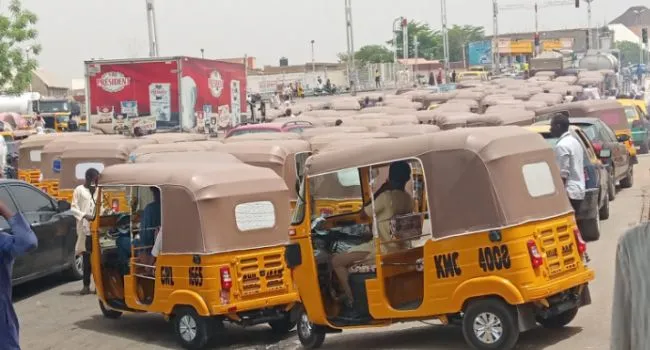Congestion in Kano metropolis occasioned by the high number of vehicles plying the roads and the attendant carbon monoxide pollution are increasing concerns on the effects of environmental hazards on people in the ancient city.
The situation is further compounded by the unabated desertification that has hit the state in the last few years as a result of the demand for more physical structures, leading to the cutting down of trees within the metropolis which in turn has ramped up temperature in the city to a record 43 degrees Celsius.
Experts have raised alarm that it was the first time in the history of Kano that temperature was that high.
Kano is one of the largest cities in not only Nigeria, but in the whole of Africa with a growing population estimated to be getting closer to 20 million people. The large population of people and ease of doing business in the state have added to the crowded nature of the state.
Over the years, Kano has encountered huge urbanization challenges, ranging from rapid population growth, overcrowding, proliferation of slums, increasing vehicular and industrial pollution, overused urban facilities and urban poverty resulting in various environmental, economic and cultural issues.
But of great concern to residents is the recent trend of converting designated green areas into construction sites, thereby destroying the environmental buffer that the green areas are meant to provide. Trees are cut down and buildings are erected but the trees are not replaced.
A resident, Asiya Rodrygo, raised concern on Twitter thus: “Kano has had to face very debilitating climate effects. No substantial rains and extreme heat. Air pollution is high in the municipal areas. Yet our government has not prioritized green spaces to buffer citizens from the heat and purify air quality.
“The lack of power across the city further compounds the effects of extreme heat. Generators on overdrive only create more air and noise pollution. Is this a conducive environment for students to focus on their studies? Yet even our few grassy areas are under threat of being incorporated into an empire of concrete blocks and interlocking tiles. The next government must halt this obsession and consider the long-term health and well-being implications for Kano.
“In terms of cost-benefit analysis, productivity is low when people are unable to cope with the heat and there will be greater pressure on state emergency and health services. This will ultimately also affect the government’s purse,” she lamented.
Another resident, Aliyu Gumel said “This is a very important aspect that the government in Kano is overlooking and it’s been on for a long time. Asides this, I’ve not seen anywhere in Nigeria with so much mosquitoes like Kano. The government should take these issues seriously to save its people.”
Meanwhile, environmentalists said failure to adopt a proper environmental planning is what led to the harsh weather and other pollution challenges in the state.
According to them, there are other cities in the world that are bigger in population and size than Kano State, but were able to withstand the pressures and have maintained a healthier environment.
A lecturer with Department of Environmental Management in Bayero University Kano (BUK), Dr Idris Garba, said Kano’s population and high number of vehicles, coupled with the cutting down of trees, escalated the situation which tampered with the ozone layer which normally reduces the sunlight penetration on earth.
He said the population of the state cannot be blamed for the problem as there is adequate land for proper buildings and planting of tress that will accommodate human activities in the state.
Dr Idris, however, said tree planting control and use of machineries and vehicles in the state are key in managing and maintaining a more habitable environment.
He added that proper planning of structures could also help alleviate the problem.
“Proper planning can also reduce it because if you plan, it means that you have a plan of putting the vegetation and trees that could also reduce the amount of gases.
“Most of our cities are not properly planned. If they are well planned, you will find out that we leave space for all these activities and that will reduce the amount of gases released into the environment and also reduce the amount of heat into our environment.
“Sometimes, because of construction each environment has its own setting which we have to put into consideration while erecting our structures,” he said.
He also urged the general public to adopt the habit of sacrificing their lands and other places for tree plantations, noting that they should plan their environment properly by providing space and planting trees and other plants.
Speaking to Daily Trust, the Public Relations Officer of the Ministry of Environment, Sunusi A. Kofar Naisa, said the state has planted three million trees in the past two years and is also in the process of enacting a pollution control law.
“That Pollution Control Bill contains all that is needed for a safer environment including the transportation system, constructions, tree planting and so on,” he said.

 Join Daily Trust WhatsApp Community For Quick Access To News and Happenings Around You.
Join Daily Trust WhatsApp Community For Quick Access To News and Happenings Around You.


